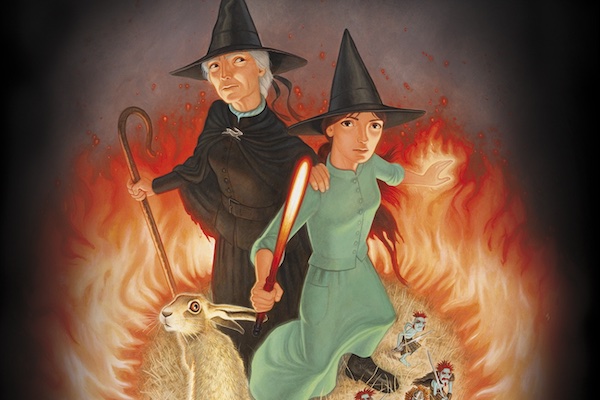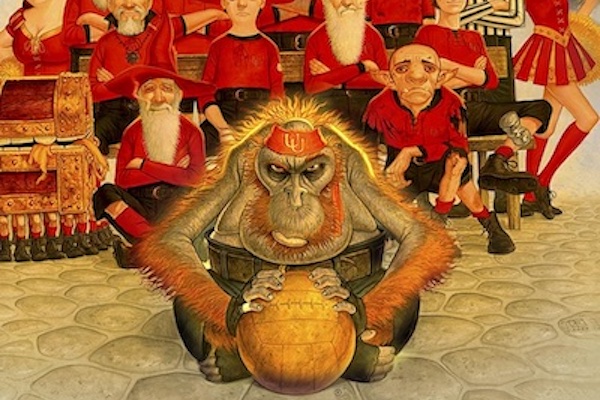It’s time for Wee Mad Arthur to find his people. It’s a great retcon, in fairness.
Summary
Tiffany and Mrs. Proust come upon the Feegle, who have found Roland and his fiancée and soon-to-be mother-in-law in a pub. The Feegle have caused such a ruckus that the Watch have been summoned. The eyeless man appears and Roland becomes suspicious of Tiffany when she tells him of his father’s death. Carrot tells Tiffany that he’s arresting her because he cannot arrest Feegle, and Angus takes Tiffany and Mrs. Proust to the cells to keep them safe. Tiffany and Mrs. Proust argue, and the older woman slaps Tiffany; they realize that they’re being affected by the eyeless figure too, that perhaps it is responsible for creating anti-witch sentiments whenever they erupt—a new problem that sprung from Tiffany kissing the winter. Mrs. Proust tells Tiffany that there’s someone she needs to speak to, who will find her when the time is right. Watchman Wee Mad Arthur finds the Feegle and admits that he was raised by gnomes, but they found him as a baby: Turns out he’s a Feegle too. Tiffany and Mrs. Proust wake in the morning and Constable Haddock tells them he’s been advised to let them go with a warning, and that Commander Vimes has ordered that the Feegle be out of the city by sundown; they caused such a stir that the King’s Head pub has been turned back to front.
Tiffany and Mrs. Proust head to the pub formerly known as the King’s Head to find Commander Vimes displeased with the current turn of events. Mrs. Proust suggests that the pub be renamed the King’s Neck (rather than the more incendiary King’s Back), and the eyeless figure reemerges. Tiffany is dropped down into the sewers and follows a voice who tells her to keep up. Said voice turns out to be Eskarina Smith, who has brought Tiffany to the Unreal Estate to tell her that the eyeless figure is the Cunning Man—a creature born of an ancient story, who used to be a witch hunter in the name of Om and was killed by a witch he fell in love with because she saw the darkness in him and pulled him into the fire with her. She tells Tiffany that she will have to be ready to be taken over by the Cunning Man and outwit him. Tiffany realizes that she’s in the presence of the only woman who became a wizard, but no sooner has she figured this out then Eskarina’s massive shamble breaks and she tells Tiffany to take her broom and make a run for it. Tiffany gets home with the Feegle (and Wee Mad Arthur, who’s come along), and finds human guards at the Feegle mound, one with a shovel. Tiffany tells the Feegles not to kill anyone while she sorts this.
Sergeant Brian tells Tiffany that they’re here on the Baron’s orders, and they’re to retrieve Amber, who the people believe was “given” to the Feegles. Tiffany reminds him that she is the granddaughter of Granny Aching, who would never allow this, and has his men lay down their weapons, asking Rob to fetch up Amber, who doesn’t want to leave at all. Jeannie tells Tiffany that Amber learned the soothing songs, and that she’s as close to a kelda as a human can get. Tiffany goes and speaks to Roland, who asks if she killed his father and stole money from him, which Tiffany insists she did not. She tells Roland that she is taking Amber home with her for now. Tiffany has a dream where she’s on fire but it doesn’t hurt. She talks to Amber about her young man, who is a tailor. When she goes to the castle the next day, Letitia’s mother the Duchess is so horrible that Tiffany winds up talking back to her. The Duchess tries to get Tiffany thrown in the dungeon, but Preston, the newest guard won’t do it, and is too clever by a half in any case. The castle cook believes that she saw frogs in her boiling pot and accuses Tiffany of killing the old baron to keep Roland for herself. The woman is drunk, and in her ranting, she falls into the cellar and dies.
Roland tells Tiffany she must leave the Chalk while the Duchess watches the proceedings. Tiffany points out that Roland isn’t actually accusing her of anything, just suggesting things in connection with her, and she demands a hearing of her peers. The guards are told to lock up Tiffany’s broomstick, but Tiffany locks herself in the dungeon, telling the Feegle to bring Toad in to discuss her legal counsel. Later on, Letitia comes to see her, sobbing, and Roland and the Duchess appear, assuming that Tiffany is trying to lure the young woman to her. Tiffany makes a joke about keeping spinning wheels away from her, prompting a fight between Roland and the Duchess because she wants all of them burned, but Roland’s mother used to spin and he won’t let anyone touch her wheel. Tiffany lets Brian know that she will escape the dungeon, but be back in the morning. She goes to Letitia’s room because she could tell the young woman was trying to apologize to her: She is the one who cast the spell that made everyone turn against Tiffany because she worried about how close Tiffany was to Roland. Tiffany can’t understand why the spell worked because she got it out of a fake book, but when Letitia raises a hedge stick into the air, there’s blue light…
Commentary
Well, it only took over two decades and over two dozen Discworld books between, but we finally learn what became of Eskarina Smith.
It’s sad, but in a way it could only ever be sad, couldn’t it? Esk’s story didn’t have much bearing on the way this world unfolded, which means that she’s not here at the forefront, bringing more women into wizardry as everyone thought she might. Simon also didn’t change the face of magic as the world knew it. I’d say that’s disappointing, but I’m frankly impressed by how true-to-life it turned out, completely by the accident of all the rest of the Discworld books—the suggestion is that Simon’s brilliance came with a great deal of deterioration, and that Esk basically took care of him until he was gone. She has a great font of knowledge that can really only be understood by her. She’s older and she’s time traveling and she’s experiencing everything at once. As Tiffany notes, “that somehow she was everywhere else at the same time.”
Which means that after giving Esk some time as the King Arthur of her own tale, learning to be animals from Granny, she has looped all the way back onto being Merlin herself. Living all of time at once and deeply disconnected due to that. Do I think that it’s interesting how Merlin’s difficulty with time seems to closely resemble dementia or Alzheimer’s? I sure do. Do I think it’s relevant that Pratchett brought Esk back at a point when he himself would have been feeling the effects of that disease? Absolutely.
A thing that hit me this time around: Eskarina talks about how one of the people who might let the Cunning Man in is “some girl who is wearing quite dangerous cult symbols without an inkling of what they really mean.” And then, naturally, she turns out to be right because that’s precisely what Letitia did, though Letitia had a much more active desire to understand magic. Which in turn can only make me think of how many people do this without putting thought into it at all.
Obviously, I’m not saying that makes it okay to try and “catch out” teenage girls wearing band shirts because you think that they don’t know enough music to be “real fans” (please stop doing this). But I do remember the point in my childhood when I would wear/display anything that I liked the look of, and finally reaching the point where I realized how thoughtless or even dangerous that could be. Everything is imbued with meaning, and while it’s fine to enjoy things for aesthetic purposes, it’s wild to notice how many people simply don’t want to move deeper than the vibes level.
The number of times that people in this book try to tell Tiffany to simply throw Amber back to her family is important. Obviously, the choice should only ever be Amber’s, but when there’s pressure, Tiffany almost caves to it for the sake of appearing reasonable. Which leads to the book really coming for the nuclear-family-as-a-given premise when Tiffany then thinks of how Granny Weatherwax always says that evil comes from treating people like things:
And right now it would happen if you thought there was a thing called a father, and a thing called a mother, and a thing called a daughter, and a thing called a cottage, and told yourself that if you put them all together you had a thing called a happy family.
That. That right there. That belief that anyone from a remotely dysfunctional family knows generates abuse and sometimes far worse. Amber is lucky to be alive, and if Tiffany assumes that the nature of family is a thing that just exists—not a choice that people must actively make—she is enabling evil. That is what the story is saying.
This section of the story is also endeavoring to explain how Roland and Tiffany never came to be, after a few of these books that suggested they might. And I love the framing because it’s an age-old thing: believing they were meant to be together because they were both different and mistaking that for being alike. Being two relative outsiders of differing genders who want to hang out is always going to get the neighborhood talking, silly as that is. Tiffany’s hurt at not recognizing it sooner is both fair and inevitable—she was too busy to notice, but noticing is what she’s supposed to do. Of course she’s sore about it.
But at least she’s finally arrived at the point where she can start sorting things through.
Asides and little thoughts
- Carrot coming in there wanting to know what the Feegles are doing in his city, sounds like someone has taken his work dad’s lessons to heart.
- This, as far as I can recall, is the first time that Vimes has been unequivocally described as “tall” and I won’t accept it. He just looks tall to Tiffany, who is very short, and that’s the story I’m sticking to. I’m not saying that Vimes is as small as a dwarf, or even as short as Nobby, but he is not tall. Carrot is overly tall, Sybil is tall, Vimes is under tall. He’s middling. This is very important to me personally.
- Miss Tick had said that Eskarina was the girl that got a wizard’s staff by mistake! This is an adorable trans joke. For sure. There’s no way that it’s not intended to be, with the exclamation point and all. And that’s without even getting into Eskarina talking about how she took that knob off her staff and it works better than way.
Pratchettisms
At this point Mrs. Proust took a pinch of snuff, at such speed and volume that Tiffany was surprised that it didn’t come out of her ears.
He looked like a cat on the day it rained mice.
“Wizards are like cats going to the toilet in that respect; once you’ve walked away from it, it isn’t there any more.”
And on that day, with a pocketful of charred stars, not knowing what it was she was doing, but determined to to do it, she had become a witch.
It was as if fire had just dropped in for a friendly visit, not for business. Its flames rustled.
There was a scream from the distant kitchen, and one thing that makes human different from animals is that they run towards a distress call, rather than away from it.
Roland was staring at Tiffany, so nonplussed he was nearly minused.
But the Duchess had no common sense, probably because it was, well, too common.
Next week we finish the book!












